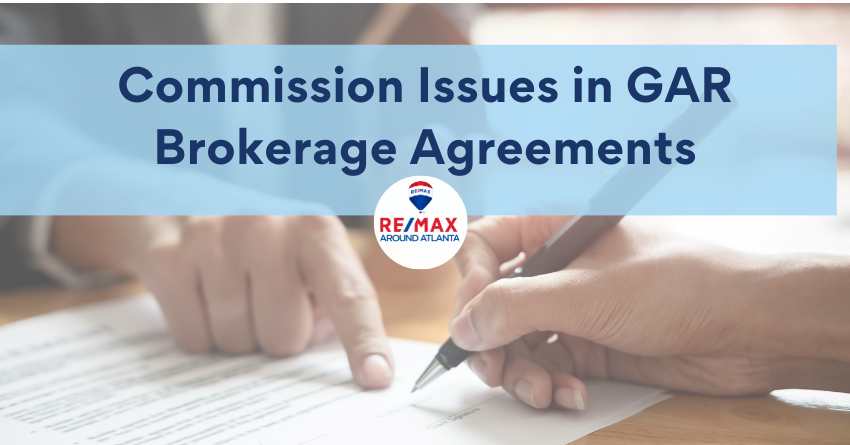|
Although the GAR Purchase and Sale Agreement (PSA) includes commission protection language, it does not provide a space to fill in the amount of the commission or the split of the commission with any cooperating broker. The amount of the commission and any offer to split the commission is included instead in the Buyer Brokerage Agreement (BBA), the Seller Engagement Agreement (Listing) and through FMLS or MLS. Buyer Brokerage Agreement. (BBA) Both the Exclusive and the Non-Exclusive BBA include a blank to indicate the amount of commission to the paid to the selling broker. Typically, we see the commission amount completed. However, sometimes the commission space is left blank and a statement included that the seller pays the commission. In those cases, if the buyer defaults or if the buyer enters into a contract to purchase with another realtor during the term of the BBA or during a protected period, the buyer’s broker will not be able to recover from the buyer. (Remember that a black space always indicates zero.) There is language that in the BBA that can relieve any buyer anxiety of being responsible for the full commission. The Commission section in the BBA provides that the buyer is responsible for the commission “minus any commission paid to Broker by either the seller’s broker or the seller.” This safety valve for the buyer will generally get a buyer’s agent over the hump of the buyer’s fear of including a commission in the BBA. Distinction Between the Exclusive and Non-Exclusive BBA
The GAR Non-Exclusive Buyer Brokerage Engagement Agreement is similar to the GAR Exclusive Buyer Brokerage Engagement Agreement in that the broker agrees to look to the seller or seller’s broker for commission. However, there is a critical difference between the two agreements. With the GAR Non-Exclusive Buyer Brokerage Engagement Agreement, the broker can only recover a commission from the buyer if the buyer purchases property identified to the buyer by the broker during the term of the agreement—in other words, if the broker was the procuring cause. This is in contrast to the GAR Exclusive Buyer Brokerage Engagement Agreement, under which the buyer’s broker can claim a commission for sales made during the term of the agreement whether the property was identified to the buyer by the broker or not. Obviously, the Exclusive BBA is always best for the buyer’s broker. The Non-Exclusive BBA should only be used for unique situations. The Seller Brokerage Engagement Agreement Both the GAR Exclusive and Non-Exclusive Seller Brokerage Engagement Agreements set the amount of commission that the seller will pay upon a sale of the property. The agreements also contain blanks that the parties fill in to establish what commission split the broker will pay to any cooperating broker who procures a buyer. The agreement specifically makes cooperating brokers third-party beneficiaries to the agreement. This allows cooperating brokers who are not directly in contract with the seller to nonetheless pursue claims against defaulting sellers for their commission. It is required that the seller’s broker complete the commission split section both to inform the seller of the terms of the split (required by GREC and license law) and to establish the terms for inclusion in FMLS and MLS. It is critical that brokers fill in these blanks to protect their commission, since the GAR Purchase and Sale Agreement no longer contains a place for the parties to write in the commission split for cooperating brokers. Sources: Weissman, Seth. The Red Book on Real Estate Contracts in Georgia (p. 1442-1452). BookBaby. Kindle Edition. GAR F101, F110, F113, F201
0 Comments
Leave a Reply. |
RMAAReal Estate News, Brokers Blog & More Categories
All
Archives
July 2024
|


 RSS Feed
RSS Feed